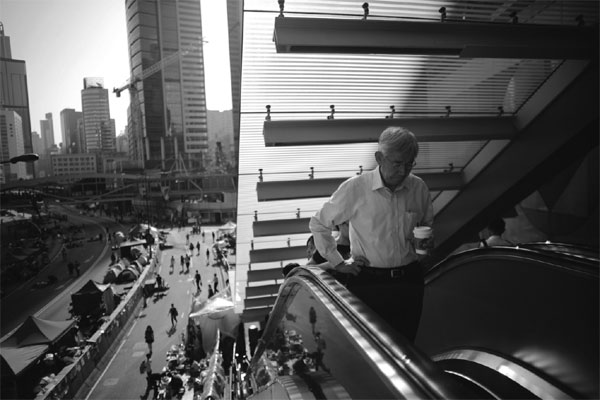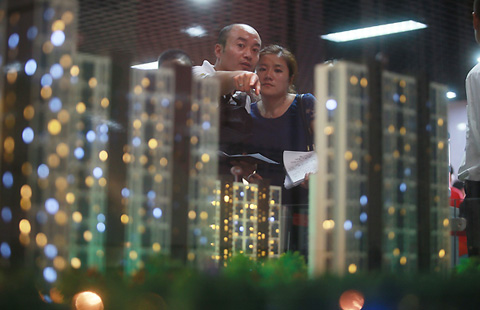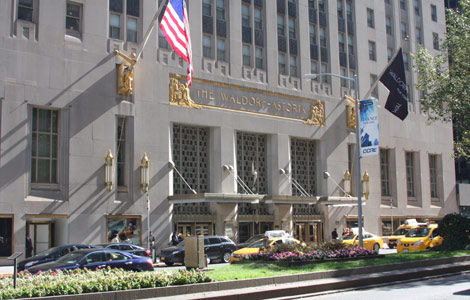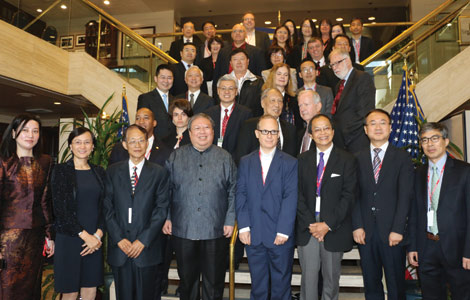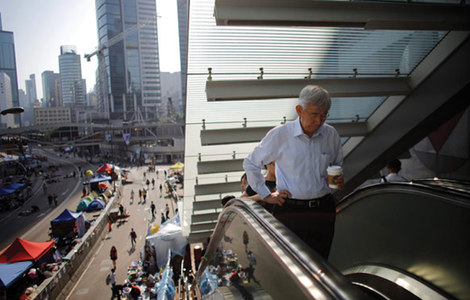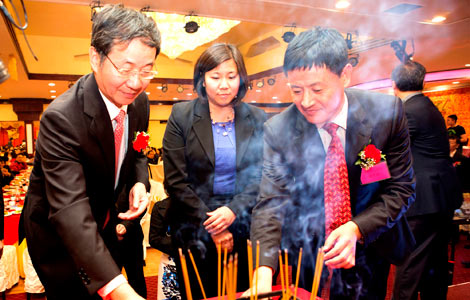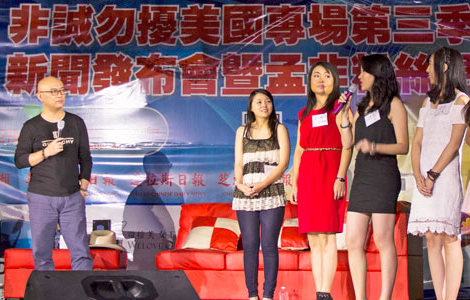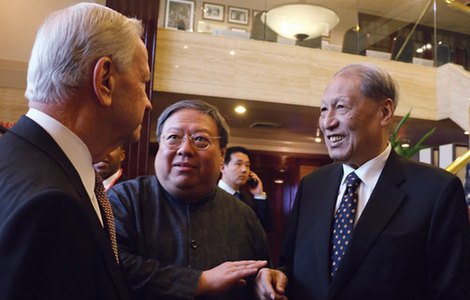Many voices call for end to HK protest
Updated: 2014-10-06 14:10
By Bian Jibu in New York(China Daily USA)
|
||||||||
As cracks widened among protesters in Hong Kong, government and community leaders called on the crowds to abandon their blockades of major roads and government buildings for the sake of personal safety and the greater good of the public.
Since Sept 28, when the blockades began, 165 people have been injured.
Thirty people were arrested in connection with recent clashes in the Mongkok area, and 21 police officers have been injured, according to government figures.
The Hong Kong government, in a statement released earlier on Sunday, renewed its push for reopening the roadways and pedestrian access to the government offices before Monday. It also called upon protesters to reopen roads in the Admiralty district to "alleviate the impact on traffic".
A government spokesperson also said the "door to dialogue is always open" for the Hong Kong Federation of Students, one of the key initiators of the protest. Senior officials are ready to reconnect with the students to prepare for dialogue, a statement read.
The student group's secretary-general, Alex Chow, announced at 9:15 pm that the group is preparing to talk to the government, but he said the occupation activities would continue during the talks.
Meanwhile, the government announced that 32 secondary schools would resume classes on Monday.
The Transport Department said in a press briefing that if barricades on one of the two major roads in Admiralty were cleared, 70 bus routes would resume service.
Across the Americas, Chinese business leaders, community leaders and professionals have expressed their support for the Hong Kong Special Administrative Region government and called on young demonstrators to end their protests.
Fred Teng, chairman of the Hong Kong Association of New York, said the Hong Kong police and Hong Kong government have exercised the utmost professionalism and cool-headedness.
"The organizers of this 'Occupy Central' movement underestimated the Hong Kong government and the Hong Kong people," Teng said. "The Hong Kong government, from Chief Executive Leung Chun-ying on down, acted very professionally and seriously dealing with this matter every step of the way."
"A few months ago, 1.5 million Hong Kong residents signed petitions against this movement, and wanted the universal suffrage to go forward for 2017," Teng said. "The organizers also underestimated local residents' negative reaction to the disruptions of their normal life."
Teng said as the Occupy Central movement subsides, he hopes Hong Kong can start the second stage of the consultation regarding the constitutional development regarding the election of the chief executive in 2017.
He said fortunately, most investors were not very concerned about this protest, adding that the Hang Send Index only dropped 5 percent at the lowest point and already started to recover on Oct 3.
"Overall, business people and investors have a lot of confidence in Hong Kong. And the actions of the Hong Kong government and the Hong Kong police did not disappoint them," Teng said.
On Sunday the Committee to Promote the Unification of China- San Francisco Bay Area Chapter held a discussion on the anti-Occupy Central movement in San Francisco's Chinatown.
Choi Man-yiu, vice-president of the committee, said the occupy movement was "totally wrong", asprotestors are using un-democratic means to blindly pursue their so-called universal suffrage and sacrificing others' interests to gain their own.
"The result of the protest was not democracy, but public anger," Choi said. "They didn't put Hong Kong's interests first and that's not real democracy."
Choi said the achievements made in Hong Kong over the past 10 years have been made possible by the hard work of the Hong Kong people, which was not understood and appreciated by young protesters.
"We support the government to maintain order in accordance with laws and suggest the protesters calm down and resume peace talks with the government," Choi said.
The committee released a statement on Sept 28, saying that the organization strongly opposes the protests in Hong Kong and protesters who seriously damage the public order and others' welfare.
The Coordination Council of Chinese-American Associations (CCCAA), an organization which serves the Chinese-American community in the greater Washington area, also released an open letter to people in Hong Kong on Oct 2, urging Hong Kong residents to boycott Occupy Central in order to resume normal life and work.
It praised China's central government for strictly keeping its "One Country, Two Systems" pledge and in making historic progress in Hong Kong's democracy.
"The 28 governors during the British rule were all appointed by the British government and Hong Kong didn't even have a symbolic democracy," the letter pointed out. The letter also asserted that the organizers of the protests carry an ulterior motive that will undermine Hong Kong stability and prosperity.
Qiao Fengxiang, a professor at Texas Southern University and president of the US-China Friendship Association in Houston who went to Hong Kong in 1997 prior to Hong Kong's returning to China, said: "I know that when under the British rule, Hong Kong people didn't have any say in politics. After it returned to China, the overall political environment has been relaxed. It should be governed as stipulated by the National Emblem of China."
The students should not take to the streets because it affects the normal order and people's order, Qiao said, and it's nice that Hong Kong police did not take any drastic measures.
SeverinoCabral, chairman of the Brazilian Institute for Chinese and Asia Pacific Studies, said Hong Kong did not enjoy the right of elections during the governance by the United Kingdom and it was the Chinese government that allowed the people in Hong Kong to elect their governors, which is a gesture of kindness and tolerance.
"Themovement is over claim because Hong Kong is a part of China'ssovereignty, which is the bottom line and should not be challenged. Countries like China and Brazil should be strong about such issues becausedemocracy is nothing if there is no complete sovereignty," said Carbal.
Dr George Koo, an international business consultant and a member of the Committee of 100,believed the HKSAR government has been careful and dealing with the movement with kid gloves.
Under the principles of "One Country, Two Systems", Koo said, Beijing should not interfere but allow the SAR administration to deal with situation. "An exception to this principle would be if the occupy movement threatened to secede from China and/or if it can be shown there is a presence of foreign agitation and interference in the movement," Koo said.
Asked about his suggestion for the best solution to end this standoff, Koo said the HK government should merely standby and monitor the protest so long as the movement remains peaceful and orderly.
"When protesters become disorderly and break the law, they should be dealt with firmly according to the law, just as they would be in the United States," Koo said.
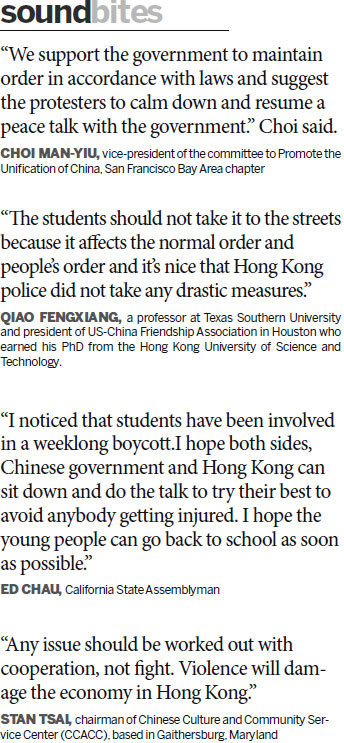
|
Back To Work Government employees arrive to work as they walk along an area occupied by protesters outside of the government headquarters building in Hong Kong on Monday. Some protesters left the Mong Kok area of the city. Photo By Carlos Barria / Reuters |
(China Daily USA 10/06/2014 page1)
Most Viewed
Editor's Picks

|

|

|

|

|

|
Today's Top News
HK occupiers urged to reflect on campaign
Big believer in real estate now a skeptic due to sluggish sales
WB cuts China growth forecast
World Bank weighs protest's economic impact
162,629 'phantom' staffers taken off govt payrolls
Holiday tourism enthusiasm continues in China
Smog, fog to shroud China
Services growth hits 8-month low
US Weekly

|

|
